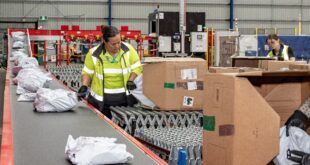The report was conducted by Eunomia Research and Consulting and commissioned by the Environmental Investigation Agency.
At the fourth round of plastic treaty negotiations, Rwanda and Peru proposed a global target to reduce plastic production by 40% by 2040. However, the report has found that even if this target was adopted it will not be enough for the plastics industry to meet the 1.5°C climate target set under the Paris Agreement
Plastic production is said to be currently responsible for four times more greenhouse gas emissions than the aviation industry yet is “noticeably absent” from the climate negotiations as a source of emissions.
To understand the climate implications of the 40×40 target, the Environmental Investigation Agency commissioned modelling by Eunomia for how the global economy might respond to the target. The report modelled both business as usual demand and reduced demand scenarios to understand how a 40×40 target would impact CO2 emissions by 2050.
The report found that a 40×40 target is not sufficient on its own to meet the 1.5°C target, but it would need to happen alongside decarbonisation of the plastics sector. Other measures such as increased recycling rates would also be required as part of the package of policies to support reduction efforts.
The report concluded that:
- Business as Usual growth trajectories for virgin plastics production and demand would breach a 1.5°C for the plastics sector by 360%
- A 40×40 production reduction pathway, coupled with demand reduction of at least 35% and industry decarbonisation would align with a <1.7°C carbon budget, still overshooting <1.5°C by 40%.
- Even with strong demand reduction along 40×40 levels and significant decarbonisation of the plastic value chain, the industry is still far off aligning with the 1.5°C target.
- If the current demand trajectory is maintained, the 40×40 target is unlikely to be achievable as it would require a minimum of a 63% recycling rate.
- All action assumes a peak in 2025 where both demand and GHG intensity begin a downward trend. Further delay jeopardises any reduction targets and climate goals.
The report has been launched today at an event hosted by the Federated States of Micronesia at COP29 in Baku.
Dennis Clare, legal advisor for the Federated State of Micronesia said: “This report provides a clear analytical base for what signatories of the Bridge to Busan are calling for. Addressing plastic production is the sine qua non of an effective plastic pollution treaty.”
Christina Dixon, ocean campaign leader from the Environmental Investigation Agency, said: “It is clear that if we are to align the future global plastics treaty with the Paris climate goals the key will be ambition and political will. This report shows that there is still a huge gap between what governments believe is politically achievable and what is required to prevent climate catastrophe. The time to commit to a global reduction target and peak plastic is now.”
Simon Hann, LCA specialist at Eunomia and report author, commented: “This analysis finds that limiting primary plastics production could be a pivotal step in bridging the gap between current conditions and necessary targets. Such an agreement would signal a strong commitment to addressing this challenge directly.”



